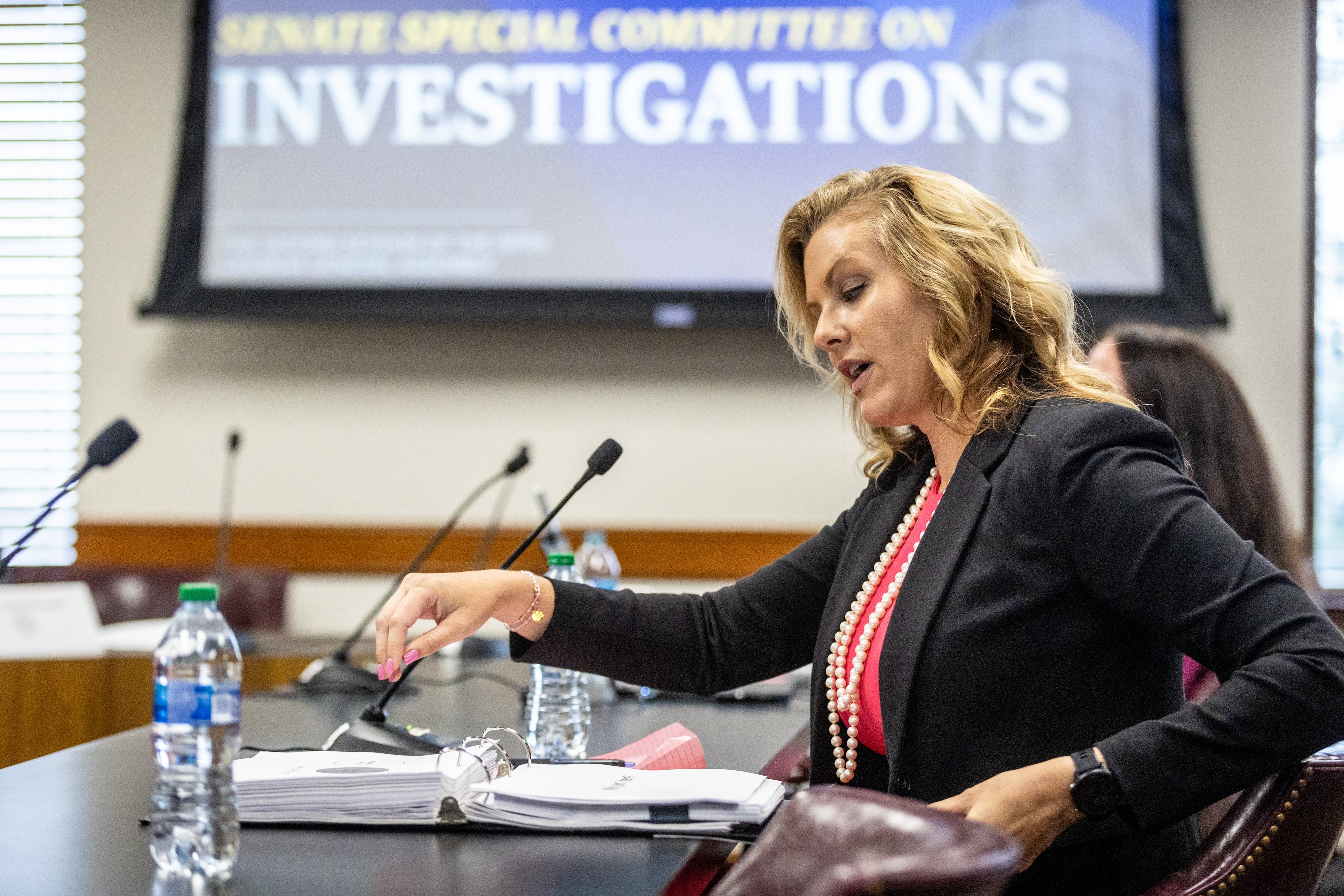Georgia dismisses Trump election case, ending his last criminal prosecution
The Fulton County judge overseeing the 2020 election interference case against President Donald Trump and more than a dozen others agreed Wednesday to kill the probe after a Georgia prosecutor said the alleged criminal conduct amounted to more of a federal, not state, case.
In a brief, one-page order, Superior Court Judge Scott McAfee dismissed the sprawling racketeering case first brought by Fulton County District Attorney Fani Willis more than two years ago.
“This case is hereby dismissed in its entirety,” the judge wrote.
Once seen as among the most promising criminal prosecutions of Trump, the case collapsed amid scrutiny of Willis’ romantic and financial ties to the special prosecutor she hired to help lead it.

Although the development isn’t a surprise, it places a capstone on the last criminal prosecution of Trump and one of the most sweeping, divisive cases in Georgia history.
Now, nearly five years after local prosecutors first launched their investigation of Trump, it ends with four plea deals from defendants and zero convictions from a jury. It’s highly unlikely any of the evidence compiled by Willis’ team and a special grand jury, which heard testimony from everyone from the governor to Trump’s top White House advisers, will ever be heard by a jury.
Willis’ office declined to comment.
Steve Sadow, Trump’s lead Georgia attorney, cheered the developments.
“This case should never have been brought,” Sadow said. “A fair and impartial prosecutor has put an end to this lawfare.”
Trump later posted on social media that “LAW and JUSTICE have prevailed.”
“We have to hold responsible those who attempted to destroy our Legal System and Nation itself as they tried to use it to silence and imprison Political Opponents for protecting our Country, and exercising our FIRST AMENDMENT Rights,” the president wrote.
McAfee’s order came alongside a 22-page exhibit from Pete Skandalakis, the executive director of the nonpartisan Prosecuting Attorneys’ Council of Georgia, who spent the past several weeks poring through Willis’ evidence.
Skandalakis, a veteran Republican prosecutor widely respected in Georgia’s legal and legislative circles, recently took over the case after the courts removed Willis.
In his filing, Skandalakis went out of his way to emphasize that his review was not shaped by politics.
He tore apart many of the individual charges brought by Willis’ team. Skandalakis concluded “the strongest and most prosecutable case against those seeking to overturn the 2020 Presidential election results and prevent the certification of those votes was the one investigated and indicted by (former Justice Department) Special Counsel Jack Smith.
“The criminal conduct alleged in the Atlanta Judicial Circuit’s prosecution was conceived in Washington, D.C., not the State of Georgia,” he said. “The federal government is the appropriate venue for this prosecution, not the State of Georgia.”
Smith withdrew his election interference case against Trump in fall 2024, shortly after the Republican won a second term. That came several months after a consequential U.S. Supreme Court ruling that concluded presidents are immune from prosecutions for their “official” acts as the leader of the executive branch.

Declining to prosecute
In his exhibit, Skandalakis detailed the portions of the 41-count indictment he found unworkable. Overall, he said he believed in a “basic truth,” that it is “not illegal to question or challenge election results.”
“Both Congress and state legislatures have long recognized this principle and have enacted detailed procedures to permit such challenges,” he said.
Regarding Trump, Skandalakis said there is “no realistic prospect” that a sitting president could be compelled to stand trial in Georgia while he’s still in office. And even after that, it could take years to litigate the complex presidential immunity issues and constitutional fights raised in the indictment, he said, resources his organization does not have.
“In my professional judgment, the citizens of Georgia are not served by pursuing this case in full for another five to ten years,” he said.
Skandalakis said it would be “illogical,” “unduly burdensome and costly” to try the remaining 14 defendants in the case without Trump, given that he was the central figure named in the indictment.
In particular, Skandalakis voiced his reluctance for prosecuting the attorneys who were charged under the indictment, including those who were advising Trump.
“Certainly, these lawyers should be accountable to their respective state bars for any violations of professional conduct — and some have faced such accountability — but prosecuting these attorneys and advisors without President Trump would be both futile and unproductive,” he said.
Co-defendants Rudy Giuliani and John Eastman, who each advised Trump in the aftermath of the 2020 election, were disbarred in their home states.

Skandalakis said the three Trump electors charged under the indictment did not have criminal intent and were following legal advice from an attorney, fellow co-defendant Ray Smith.
He slammed the false statement charges leveled against Smith, Giuliani and attorney Bob Cheeley in the indictment for untruthful testimony they gave about voting fraud to the Georgia General Assembly in late 2020. While Skandalakis said their comments were “baseless,” “criminalizing such unsworn testimony would have a chilling effect on witnesses appearing before the Legislature on important issues.”
As for the charges brought against multiple people who harassed Fulton County poll worker Ruby Freeman, Skandalakis said the case would be better brought in Cobb County, where Freeman was living at the time.
Years in the making
The news is an unwelcome end for Democrats and allies of the DA, a veteran prosecutor first elected in 2020.
In February 2021, just weeks after entering office, Willis announced she was investigating the then-former president for his leaked phone conversation with Georgia’s Secretary of State Brad Raffensperger. During that call, Trump pleaded with the fellow Republican to “find” him enough votes to overturn his narrow defeat Democrat Joe Biden in Georgia.
The case made Willis, Fulton’s first female DA, a Democratic star and one of the most recognized local prosecutors in the country. But it also attracted sky-high scrutiny, death threats against Willis and the involvement of some of the state’s best defense attorneys, who devoted themselves to poking holes in the DA’s case.
Ashleigh Merchant, the attorney who exposed Willis’ romantic relationship with special prosecutor Nathan Wade, cheered Skandalakis on Wednesday for “doing the right thing.”
“All we ever wanted was for a neutral prosecutor to evaluate this case without any political or personal motivation,” said Merchant, who represents defendant Mike Roman. “We believed in Mr. Roman’s innocence from the first day and knew if someone who was unbiased took the case they would agree that this case should never have been brought into our court system.”

Josh McKoon, chairman of the Georgia GOP, whose organization paid for the legal defense of the three Republican electors, also praised the decision to end the case.
“This dismissal is more than a legal victory — it’s a soul-stirring affirmation of resilience,” he said.
Willis was ousted late last year after an appeals court ruled in favor of Merchant’s motion, which argued that the DA’s relationship Wade created the appearance of a conflict of interest. Georgia’s Supreme Court in September declined to step in and hear Willis’ appeal, which cleared the way for Skandalakis’ appointment.
Skandalakis said he took on the case after he wasn’t able to find any other prosecutors willing to do so.
In his filing, Skandalakis even raised questions about the alleged criminality of the Trump-Raffensperger phone call, the incident that incited Willis’ investigation in the first place.
“While the call is concerning, reasonable minds could differ as to how to interpret the call,” he said. “… When multiple interpretations are equally plausible, the accused is entitled to the benefit of the doubt and should not be presumed to have acted criminally.”
Under McAfee’s order, the charges could technically be refiled within the next six months, although that is considered highly unlikely given the underlying political dynamics and the rapidly approaching statute of limitations for the crimes alleged in the indictment.
The dismissal could put a significant financial strain on Fulton County, which is now likely on the hook to reimburse the 19 case defendants millions of dollars for their legal bills under a new state law.
Defendants now have 45 days to detail their legal expenses to McAfee, who will later determine what is considered “reasonable” under the law.



